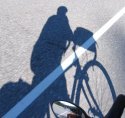
Joe's Stories from the Road
for the month of June 05
June 3
The Hitchhiker
I bicycled ninety-one point nine two miles the day I left Calgary, Alberta, Canada. That is my best day so far. I’ll have a few days over 100, I hope, before the end of the trip. I crossed millions of acres of wheat fields and ranches on the flat prairie east of the Rockies. Then, that Chinook wind from the southwest almost stopped me. The next two days I barely was able to grind out 35 miles. The headwind made me feel like I was climbing a mountain at 5 miles per hour.
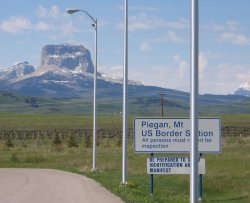
I was approaching the border crossing back into the
United States on the Alberta Plains.
During most of the day I continued to recall what happened on
this lonely stretch of earth back in June of 1967.
My mind wandered.
What had happened to the young man?
And the custom’s officer?
Who was the man driving the car?
And did dad ever forgive his son?
I stopped several times and photographed the crossing as I
approached it from the north.
I couldn’t get the young man off my mind.
I have asked David to edit my manuscript of the first
ride on this day and insert it here so you will understand.
(Editor’s note- the following story is from Joe’s original 1967 Discover Bicycle America Tour.)
1967 Hitchhiker Story
I left Canada through the customs station near Saint
Mary’s, Montana. Earlier,
as I was riding down the main highway east of the Rockies and north of
the border I came upon a young man about twenty years old who was
dressed in jeans, wore long shoulder length hair, a beard, and had a
bright red pack on his back.
I had been on the road all morning riding through country with
very few farmhouses. The
towns were twenty to thirty miles apart.
Someone to talk to was a welcome sight, so I stopped.
We introduced ourselves and began walking down the highway with
me pushing the bicycle. The
sun bathed the flat Alberta wheat lands around us.
To the west we could see the jagged, snow-capped mountains
sticking up like a row of teeth from a snarling dog.
The northwest sky was dark blue, nearly what you would think
space beyond our planet would look like.
There was very little traffic so we walked in the middle of the
road. It was easier to push
the bicycle there.
As we walked, I asked a few questions to try to start
a conversation. The kid,
whose name was Dan, did not have much to say.
He did tell me he was an American.
He was not being rude.
He just seemed to be thinking.
I thought about getting back on the bicycle and leaving him but
decided against it because I would feel embarrassed for stopping and
then leaving.
We just walked in silence for a couple of miles before
anything much was said.
Then I asked, “Why did you come to Canada?”
After speaking, I realized that I might be violating his privacy.
“I’m sorry,” I said, “I didn’t mean to say that.
I was just trying to talk.”
But it turned out that I had said the right thing.
“That’s okay,” he answered, “I came to Canada to dodge
the draft. A lot if kids
are doing it.” He paused a
minute. “Yeah, I came here
to dodge the draft and now I’m going back.”
I did not mean to be nosy.
He wanted to talk. I
knew how he felt because there had been so many lonely days on my trip.
Sometimes the urge to talk became so strong that if there had
been just a few more miles between towns, I would have talked to myself.
So I asked, “Why are you going back?”
“My mom and dad have separated because of me dodging
the draft. Mom thinks I’m
right. You know how moms
are- they will go to any lengths to keep their children under their
petticoat. Dad thinks I’m a
-----. He says I’ve skipped
out from the country that gave me everything.”
He looked at me intently.
“Do you believe in that ---- war?”
It was the first time anyone had really asked me how I
felt about it. “Well, I
don’t think that since we’re over there we should let them take over
South Vietnam.”
“Eight or ten years ago we went over there with large
forces,” he said. “Now, you
tell me why in the hell didn’t we do the job and get out?
Why do we have to keep playing around and keep losing American
lives? It’s not that I’m
completely against the war.
I’m against prolonging the ---- thing the way they have.
No war should be fought for economic reasons, and that’s what’s
happening.”
I let him go on.
I just listened.
“Now, here I am,” he said.
“I’m going back. I’ll go
into the army but it’s not because I believe in their war.
It’s because later in life I don’t want to take my children to
two different homes to visit their grandparents, my mom and dad.”
I knew he wanted to catch a ride and couldn’t while I
was with pushing the bicycle with him.
I wished him good luck at home, straddled the bicycle, and
pedaled on down the road.
He had given me something to think about and I can do that best when I’m
alone.
Later in the day, I came upon the U.S. Customs shack
standing all by itself out on the plains.
The border officer on duty invited me in to have a cup of coffee.
He was by himself and I guess he just wanted a visitor.
A rest would feel good, so I went in.
He poured me a cup of steaming coffee.
We sat and talked a while.
He asked me where I was from and where I was going- the questions
I was asked daily. While we
were talking, he looked toward the all-glass door and said, “There’s one
of them ---- hippies. I’ll have to check him.”
I did not realize what he was talking about until I turned around
and noticed a car had pulled up next to the building and was waiting on
the guard to wave it into the United States.
Instead of just motioning the car on through, as he
had a couple of others, he got up and walked outside.
I set my coffee on his desk and followed him. The guard asked the
driver some questions and then pointed to the “hippy” in the passenger
seat. It was my young
friend Dan with whom I had walked only an hour or two before.
“Is that kid with you?”
The driver was a young man himself.
“Doesn’t he look like he’s with me?” he responded.“You know what I mean. Did you pick him up?”
“Yes.”
“Okay, kid, get out.”
Dan picked up his pack, which was laying between his
feet on the floor, and got out.
The Custom’s man motioned the driver to
drive on and the car moved off into Montana.
Slowly, the guard looked over Dan’s long hair and hippy clothes.
“Let me see some identification,” he said at last.
I had seen all I wanted to see so I climbed on the
bicycle and rode away. When
I got out of sight of the shack, I stopped and waited.
A few minutes, Dan came walking down the road toward me.
His pack was on his back and he had taken his coat off and draped
it over his pack. When he
got near, he spotted me and smiled.
“All that ------- did was knock me out of a good ride.
That guy was going all the way to Idaho Falls.”
I picked up the bicycle and began walking with him
again. He looked over at me
and said, “Those ------ don’t know what it’s all about.
You know it?”
We walked down the highway in thoughtful silence.
End of Hitchhiker Story from 1967-68 manuscript
June 6
KRISTIN
I rode down the south shore of St. Mary’s Lake in Montana anticipating another reunion from long ago. Will Lester and Ruth Johnson be there? Will Kristin even be there? Would the famous Johnson’s Café look the same on the hill on the left just before you enter Glacier National Park? Here is what I wrote about Johnson’s Café after the 1967 trip.
(Editor’s note- the following story is from Joe’s original 1967 Discover Bicycle America Tour.)
I stopped at St. Mary’s to check my map and I saw a
small, log-built restaurant up on the hill. A good place to eat, I
hoped. It was getting on in the evening so I decided to go up, eat, and
spend the night in this little settlement on the edge of nowhere.
While the waitress waited on me, the man who owned the
place came out of the kitchen, sat down, and talked to me. He said he
had seen me ride up the hill and wondered where I was coming from. He
sipped coffee while I ate. “What do you do for money?” he asked after a
while.
“I work in different places, here and there.”
He took another slow sip from his mug. “Need a job
now?”
“It sure would help,” I said. “Know where I can find
one?”
“You stay all night with us and I’ll find something
for you in the morning. It’ll just be one day. I’ll take out for your
meals when I pay you. OK?”
That sounded great to me so I agreed.
“You sleep in that little house out there,” and he
pointed toward the side window. “Leave your bicycle outside. Nobody’ll
bother it.”
After I finished eating my new employer, who was clad
in Western clothes from head to foot, came back out of the kitchen and
introduced me to his wife and eight year old daughter. The daughter
befriended me instantly and for a very good reason. Earlier in the day
she had caught some fish down on the lake and needed someone to clean
them for her.
“She’s learned how to catch ‘em,” her dad said, “but
for some odd reason she’s never been able to learn how to clean ‘em.”
While I scraped the scales, my little friend, Kristin,
stood by and recited poetry that she claimed she had written. When the
fish were put away she wrote one of her poems on a piece of paper and
gave it to me
(end of selection from 1967 manuscript)
The wind was howling ferociously when I arrived in St.
Mary’s. But there on the
hill was the Johnson’s Café.
Les, Ruth and Kristin had gone to a medical center for regular
treatment. Les, who is 93
years old, has problems.
Ruth at 86 is going great and still has a great attitude.
What about Kristin?
I had called the Johnson’s Café before I left on this bicycle journey
hoping to find some of the Johnson family.
A woman answered and I told her my story.
The lady that answered said that little Kristin was not 7 or 8
years old in 67 but was ten.;
I asked how she knew and she answered that she was Kristin.
She was now running the Café, was married and had two sons.
Les and Ruth had kinda retired but were living nearby.
Kristin didn’t remember the bicycle rider in 67 but she asked me
to call back in ten to fifteen minutes.
I called back and Kristin said that her mother remembered me and
had always wondered what had happened to that young man.
When they came back from their medical appointments I
visited with Les and Ruth in their home near the Café.
They were happy to see me.
They both looked great.
We talked about all those years in each of our lives.
They filled me in a little about Kristin and then I met her
brother, Hugo. He also told
me about Kristin. He has
great affection and love for his baby sister.
Hugo is 68 and Kristin is 48 years old.
As I was leaving Les and Ruth’s, I told them that I was staying
in one of their cabins.
Ruth then said, “Oh, you can’t pay us. You are our friend.”
I checked in at the office and the lady said that I
couldn’t pay for my cabin.
The next morning I went to Johnson’s Café for breakfast.
I wanted to talk to Kristin before I left to ride over “Going To
The Sun Highway” in Glacier National Park.
In 1967 I had been at the Café the morning that I was to go over
the Mountain through Logan Pass and it was closed due to four feet of
snow that had fallen the night before.
So I’m back at the Café 38 years later before going over the
mountain and talking to the girl that had conned me into cleaning her
fish. Kristin fixed me a
huge breakfast with homemade bread.
She sat down and told me her story.
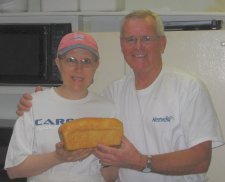
When she was 28 years old cancer was found in her
body. She was stunned and
was expecting another child at the time.
She was told by her doctors not to expect too much.
The cancer went into remission but eleven years later it showed
up again.Kristin went into
treatment at Great Falls, Montana but felt that she could get better
care in Seattle. In the
meantime her husband walked out on her because, “he couldn’t deal with
it.” Kristin’s teenage son,
Kyle, agreed to go to Seattle with her. He enrolled in school there and
stayed with her. Kyle told
his mom, “Mom, I loved you even before I met you.”
Seattle gave her the doctors and treatment she believed she
needed.For ten years
Kristin has been given eighteen months to live.
She is an incredible woman and human being.
Talking to the workers at the campground and Café, her mom and
dad, and her big brother, Hugo, it becomes obvious that she is a special
individual. While she was
in Seattle she got involved with Gilda’s Club, a cancer organization to
help people in need. The
club is named after Gilda Radner of TV and movie fame who died of
cancer. After Gilda
passed away she was honored with her name on the sidewalk in Hollywood.
Kristin was there and she told me,
“I wasn’t outside of the roped off area either.
I was inside the rope as a special guest.”
The woman that recently met Lance Armstrong on the Oprah show and
was given a bicycle by Lance is a friend of Kristin’s and has the same
kind of cancer that Kristin has.
Kristin has a master’s degree in Library Science and
taught school for 18 years.
In the summers she runs the Johnson’s Café.
She is soon going to Italy to visit her son, Klye, who graduated
from Roger Williams University
in Bristol, R.I. Her
son, Nathan, graduated from college in criminology and is going to law
school. Kristin takes her
treatments and has taken a lot of experimental treatments and lives a
very full life.
She takes care of everyone.
She called the entrance gate to Glacier National Park and it was
closed due to freezing at the top.
I decided to stay another day so I could bicycle “Going To The
Sun Highway.” I went to pay
for breakfast and Kristin wouldn’t take my money.
I ate three meals a day at the Johnson’s Café and was not allowed
to pay. Another night in
their cabin, another breakfast, and another phone call to Glacier
entrance. It was closed a
second day do to seven inches of new snow in Logan Pass.
I couldn’t wait any longer so I decided to go the long route
around the park. Hugo’s
wife, Melvina, who is a Blackfoot Indian and a great lady herself,
agreed to take me to the Snow Slide Inn near the summit so I would have
enough time to get to civilization before nightfall.
It was raining and I didn’t really want to sleep in the woods
with the bears on a rainy night.
Kristin had made arrangements for me to stay that night in
Kalispell with her cousins, Clark and Carol.
Today, in the rain again, I rode down the east side of
Flathead Lake to the town of Polson, Montana.
Two miles before I got to town the road turned to mud and gravel
due to construction. I had
to walk the bicycle two miles to the hotel.
Rocinante and I had to be hosed off from top to bottom before we
were able to go into the hotel.
The Hotel 8 people were nice about the whole deal and even gave
me a good discount. Thank
you folks.
June 10
Amazing Grace, Sacajawea, Vigilantes, and a not-to distant Earthquake
Sometimes I forget what I have shared with you.
I had to go around Glacier again.
The next time I am sitting there I will wait until the pass is
open if it takes a month.
Then I rode down the east side of Flathead Lake.
I may have told you about the heavy rains.
I had to pedal through water over the roads in several places.
State highway workers were there and told me it was okay.
When I got to the end of that day I had to push my bicycle
through two miles of construction where there was nothing but mud.
In Montana, construction companies don’t have to provide an
asphalt road while under construction.
When I finally got to Hotel 8 they were kind enough to hose
Rocinante and me down. They
sure didn’t want us to go in a room like that.
Two days later in the morning newspaper there was an
article about a mudslide that had covered the highway where I had
pedaled through the water.
They doubted the road would be open for the rest of this year.
In the same newspaper there was an article about a grizzly
killing a camper on the road that I had used to go around Glacier.
Glad I got all the way around.
I stopped in Pablo, Montana, to try to find some
people who took me in all those years ago.
I have been trying to find them for a couple of years.
I had no luck. A new
highway skips town by a couple of blocks.
I rode over to the old road to check at the grocery store to see
if anyone knew what had happened to my friends.
The grocery store is now a bar and I walked in hoping to find
someone that could help me.
It was in the middle of the day and everyone was drunk. I left quicker
than I entered. Rode the
old road part way down to Ronan.
The grain elevators were where Leonard Moore had worked.
But no Leonard. The
Volunteer Firemen at Ronan were having an all-day Pancake meal.
So, being a member of Powell County’s Middle Fork Fire
Department, I stopped by to eat and see if any of them knew what had
happened to Leonard Moore and family.
Sure enough they did know.
A young fireman who had his wife and four children with him got
on the phone and called them.
They live in another valley a hundred miles away.
They remembered me.
Mrs. Ethel Moore asked me if I ever got that bicycle tire fixed.
Then, the young fireman, John Dresen, wanted to ride with me. He
wanted to show me something. He rode to the next town, 25 miles away.
He told me I had to stop and see the old church of St Ignatius.
So we did.
There was no one at the church but it was unlocked.
We went inside and John started talking about how incredible it
was to sing there. He sang
in local churches. I
thought he might want to sing.
I asked him to sing Amazing Grace.
He sung that favorite gospel hymn better than I believe I have
ever heard it sung.I was
the only person in the audience of a church that would seat 300.

Stopped by Missoula and visited with a new friend that
I met a couple of years ago.
He is Greg Sipple and is one of the people that created the
organization, Adventure Cyclist.
They now have over 40,000 members.
A great organization that is doing a lot of good for the bicycle
riders out there in our great country.
I met several of the staff and they are a great group, too.
My next stop was Butte, the city on a mountain,
elevation 5,700. It was all
on one mountain in 1967 but now it has sprung out all over other
mountains. Even the valley below is full of homes, highways and
businesses. We’ll talk more
about Butte later.
I rode over another pass east of Butte, making the
third time I have crossed the Continental Divide, and rode into
Whitehall through several thunderstorms.
The next morning at Whitehall I rode up the Jefferson River.
This was the route that Lewis and Clark took after leaving Three
Forks. In their journals
they talk about pulling the boats up the river and that it was hard on
the crew. Many of the men
injured themselves slipping on the rocks in the river.
Lewis developed a foot infection.
Forty miles up the river I came into the town of Twin Bridges.
This is near where Sacajawea, the Indian Guide, recognized
Beaverhead Rock and knew she was near her people, the Shoshones, who
would provide the Corp of Discovery with horses and food.
At Twin Bridges I visited the beautiful bronze statue of
Sacajawea and the only dog that was taken on the Lewis and Clark
expedition.
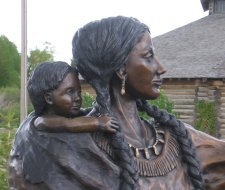
Sacajawea
From there it was to Virginia City, Montana.
It is the only place that I have visited that has not changed in
38 years. The old buildings
are just like they were.
told the lady at the hotel about coming through years ago.
She told some friends.
And the next morning they reinstated my membership into the
Virginia City Vigilantes.
They made me a member years ago.
My supper was paid for and I was invited to see play at the Old
Opera House. It is a very
unique little town.
Coming off of Ennis Pass after leaving Virginia City I
met the first woman cross-country bicyclist.
This young woman was Samantha Haberman from Aspen, Colorado.
She was 22 years old and on her way to Portland, Oregon.
If she was my daughter, I would be scared for her.
But I couldn’t tell her that she couldn’t do it.
I pray that God will take good care of her and I hope she has a
great trip. She is braver than I am. The day before, I met a young man
on a bicycle from Berlin, Germany.
From Ennis it was up another valley for forty miles.
This time I was going to Earthquake Lake.
Once at the foot of the natural dam I stopped and just looked at
what nature had done. I
remember it making a strong impression on me in 67.
In 1959, about midnight, the mountain shook from a 7.5
earthquake. The mountain
gave way and slid across the Madison River Canyon.
In just a few minutes it had built a 300-foot dam across the
river valley. The river
began filling up behind the dam immediately.
Over twenty campers were buried in their campground under the
earthen dam. Several people
were trapped up river until the Army could reach them the next morning
by helicopter. The natural
dam was lowered by over fifty feet in the next few weeks because they
weren’t sure it would hold the rising water.
If it failed, small towns downstream would be washed away.
Now I am pedaling as fast as I can to reach Jackson
Hole by Sunday or Monday.
There I will meet my sweetheart, Barbara, two grandchildren and Parnell
and Becky. Parnell is my
son in law and he is bringing his bicycle so he can spend a few days on
the road with me across Wyoming.
I’m looking forward to the reunion with family.
I love them and really miss them very much.
I wish they all could have come out to visit.
Of course, daughter Natalie came to Seattle to be with me.
And that was great.
June 12
Changes, a Poison Pit, and a Haircut
I am at mile 3,000 as of today. I am looking out my motel window in Driggs, Idaho, at the west side of the awesome three Grand Tetons. Tomorrow I will see them from the East side.
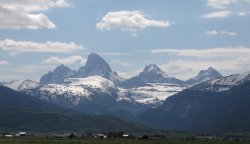
Grand Tetons
During those 3,000 miles a lot of people have asked
me, “What has changed about America?”
Sometime back I told you that we seemed more calm and enjoying
our families more. There
are other changes in our great country, too.
And I am sure that I will observe others along the way.
But here I want to talk about a few of those changes.
In 67, there were very few convenient markets with gas
pumps. There may have not
been any.There were gas
stations and grocery stores.
And at the gas station someone pumped your gas.
They still do in Oregon because some relative to a politician was
hurt due to a gas station fire.
So in Oregon someone pumps your gas.
You can’t. Unsafe.
Back then there were very few Interstates.
They had been under construction for several years but had long
gaps and were not connected.
In 67, my mother was the only person that knew where I
was. We communicated by US
Mail. I had her address and
I would send her a new General Delivery address every three to four
weeks. On the bottom of her
letters she would write, “Hold for 30 days.”
That way the Post Office would still have it when I got there if
I had been delayed. Mom and dad couldn’t afford a phone.
Now, I talk to hundreds of people on e-mail and I have no idea
how many people read my narratives.
I talk to someone everyday by cell phone.
I know that there are people in several other countries that read
the narratives. Wow.
Has America, and the world, changed?
On the highways the traffic seems about the same.
Maybe the interstates take a lot of the traffic off the small
roads.And the small roads
are different, too. In 67,
there was almost never a paved shoulder that I could ride on.
Now, nearly ever highway that I ride on has four to ten feet of
paved shoulder. That is a
nice addition. However,
that has its problems, too.
A lot of people throw their glass containers on that shoulder and I pick
up the glass and have flat tires.
Two so far. Still,
not bad. But I am
constantly watching ahead so I can avoid the glass.
In 67 I would ride into a little or big town and the
streets were organized. The
buildings usually were old but they had been built with a plan.
They were designed to fit in with the existing buildings.
The homes were in a friendly pattern.
And along the streets with homes and businesses there were
sidewalks to accommodate the people who walked.
Now, when I ride into a town the new construction is just
everywhere with no reason.
And most of the buildings, including a lot of homes, seem temporary.
It is like the people know that they will be bulldozed in a few
years. The towns of long
ago were built to stay and sustain life with warmth.
Not today. Homes are
built up a hillside, over a valley.
No sidewalks. Where
do the children ride their bicycles?
Where do you walk to visit your neighbor?
Or do you even visit?
In 1967, there were 198 million of us in the United
States. Now, there are over 296 million.
And then there was the bad one.
I rode into Butte, Montana.
I wanted to see the Berkley Pit again.
In 67 I rode over to the pit on the edge of town.
Actually, where the pit is now, was part of the town.
The pit has literally eaten up a big part of the town.
Anyway, back then I rode over and stopped at the viewing area.
There I put a nickel in the binoculars and watched the workers
with their big machines working nearly a quarter of a mile down in this
big hole. Also, when I was
there, the Mayor of Butte gave me a tour of the Leonard Mine.
And my memory is that we went down 5,000 feet below surface.
We stopped in one of the shafts and I remember when the elevator
came back up there was a huge gust of wind through the shaft we were
standing in. The city is at
5,700 feet above sea level.
Going into the Leonard Mine was unforgettable.
This time I rode down to the Berkley Pit to look again.
I was terribly shocked and I have not been able to get the Pit
off my mind. And that has
been over a week ago. The
Pit is now nearly full of water.
In the early eighties the mining company pulled the plug on the
pumps that kept the water out.
Then the Pit started filling up.
Not only has the Pit eaten up part of Butte, which is bad enough,
but the water in the Pit is highly toxic.
Poisonous. It is the
largest Super Fund cleanup site in America.
It is costing us taxpayers hundreds of millions of dollars.
And guess what? It
will never be cleaned up.
We will be throwing money into that Pit forever.
What about the Leonard mine?
It is full of the same poisonous water.
And so are all the miles and miles of shafts under the City of
Butte.

Pit of Poison
I talked to several local people about the Pit.
They are sick about it.
One lady told me that a while back a flock of Canadian Geese
landed on the Pit lake and died there.
They were not able to leave.
The lady said that the people in charge of cleanup said that the
geese must have landed in toxic material somewhere else before
they landed in the Pit. I
talked to a chemical engineer who had worked there for years and had
moved to Virginia City. He
said that the water in the Pit is deadly.
He also said that one of the problems with clean up was that the
companies involved fought over who was going to get all the Super Fund
money. He felt that may
have been more important than making the place safe for the people.
I got copies of their info on the cleanup and it assures you that
everything is going to be okay.
Maybe so, but as just an ordinary citizen I am really bothered by
the Berkley Pit. I didn’t
plan this conversation. I
rode down to the Pit and looked, read, and talked to other ordinary
people and I just cannot get it off my mind.
Now, changing the subject a little bit.
If you think that the Berkley Pit is a big change in America,
listen to this one. About
three weeks into the trip in Canada I needed a hair cut.
I stopped at a place that cuts hair.
They couldn’t cut my hair because I did not have an appointment.
Hey folks, I’m on a bicycle.
After two days and stopping in five haircut places I finally
found someone who would cut my hair.
Then, these last two days I have been trying to get my hair cut
again. Guess what?
I can’t get a haircut because I do not have an appointment.
I have tried to get a haircut in three different towns.
Now listen to this.
One place I went in two ladies were sitting down and talking.
They couldn’t cut my hair because I didn’t have an appointment.
“Well, you are not cutting anyone’s hair right now.”
I said. “We are on
break right now.” When did
hair cut people unionize?
Finally today, someone agreed to squeeze me in.
There are no barbershops anymore.
It has all gone to hair styling.
Can you imagine all the cowboys and hunters not having a
barbershop to go to where they could visit with each other and get their
hair cut? Can you imagine a
cowboy getting his hair styled?
I am going to talk to Andy Rooney about this.
June 21
PAPPA JOE! PAPPA JOE!
It is hard to say how many times Rocinante has had his
photo taken beside a famous person’s statue, a well known mountain, or
just a beautiful piece of American scenery.
Unfortunately, he can’t take my photo with those things in the
background, which is what I would like.
So he has to be the stand-in.
Speaking of horses, the day that I left the hotel, anxious to get
with Barbara and family in Jackson Hole, I noticed a horse and rider had
pulled up at the Subway Restaurant in Driggs, Idaho.
I rode Rocinante over to check things out because that was an odd
sight.
“My names Joe and I’m from Kentucky and I’m on a cross
country bicycle trip. Are
you from here or are you traveling?”
“I’m traveling from Western Montana to Albuquerque, New Mexico.”
I was impressed. I
offered to buy her breakfast and ended up buying her dog breakfast, too.
Her horse- I wasn’t sure what he could eat at Subway.
The folks at Subway thought we were quite a subject and called
the local newspaper. They set up a table and chairs outside the
restaurant so the horse could join us.
After a thirty-minute visit with Bernice I asked to write in my
book. She wrote, “The guest
– the journey – each day a new moment that reinforces the goodness of
life and the wonders- AHH! of being alive.”
I am afraid to guess her age but she wasn’t in her twenties.
She was older.
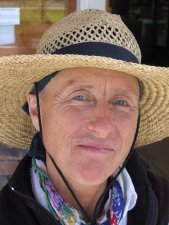
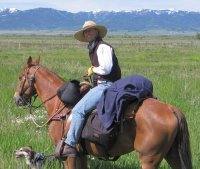
I took some photos of Bernice, her Tennessee Walking Horse and her dog and headed out to Jackson Hole to meet my family. I love them very much and miss all of them. Now I was going to be able to be with part of them for a few days. Since I was a little ahead of schedule, I thought I could get to Jackson Hole before they got there. But I had one more mountain to climb. It was the 8,000+ feet high Teton Pass with 10% grades going up the west side and back down the east side. In ‘67, it had some 12% grades on it so I asked a lady at a store in Victor if it had been made easier. “Oh yes,” she replied, “Now it is only ten percent grade. You just crawl up this side and fall off the other side and you are in Jackson Hole.” She was more than a bit skeptical that I could ride it.
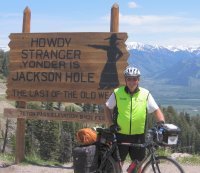
I did crawl up that mountain and once at the top, on a
bicycle, you have really accomplished something.
I called Barbara from the top of Teton Pass.
They guessed that they were
about twenty-five miles from Jackson, coming in from the south.
I was about twelve miles from Jackson.
I threw a leg over Rocinante and we were on our way.
I was excited and though I’m not sure how a bicycle can be
excited, somehow Rocinante understood my need.
We blasted off that mountain. I told Barbara that I wouldn’t go
too fast but I looked down a couple of times and Rocinante was clipping
along at 50 mph. I had to
pull back the reins several times.
When Barbara and family arrived in Jackson they found me sitting
on a wooden fence in front of McDonalds.
Rocinante and I had gotten there first.
Avery, my three-year-old grandson, spotted me first, “There’s
Papa Joe.” I got a bunch of
hugs from everyone including Parnell.
He is a son that I never had.
He is really great young man.
And Barbara Jean, I got a lot of hugs from her.
And the sound of “Papa Joe” ringing in my ears was sweet music.
I just wish all the family could all have been there.
We spent the next few days visiting the mountains of
Idaho, Montana and Wyoming.
We even found some out of the way places in Idaho that most tourists
haven’t found yet. One is a
little highway up the edge of the west side of the Tetons with a river
that has some awesome waterfalls.
We circled from Earthquake Lake through Yellowstone and the
Tetons and back to Jackson.
I like to call it Jackson Hole but Becki reminded me that the whole
valley is Jackson Hole and the little town is Jackson.
She is right. Our
last day in Jackson we went over to Teton Village and took the Jackson
Hole Tram up the mountain to over 10,000 feet.
Took photos and half froze in the snow and wind.
We had on short sleeve shirts.
This is why I tell you this:
The tram was put into business in 1966 and I rode it in 1967.
I rode it again in 2005.
And in 2006 it will be retired and will no longer take people to
the top of that awesome mountain.
So if you have never taken the Jackson Hole Tram to the top of
the Tetons you better do it now because soon it will be too late.
They will not rebuild it.
Thanks for two great rides, Jackson Hole Tram folks, which were
38 years apart.
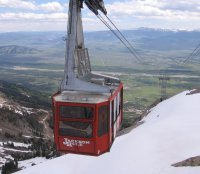
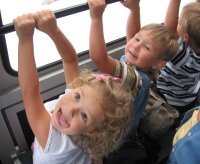
The next ride was a great pleasure for me.
I have to get Rocinante headed East.
And out of Jackson (Hole) Parnell is riding with me.
Parnell, that was awesome riding along those incredible mountains
with you just in front of me.
Of course some of the time you were behind me.
But that was only because you have respect for older men that may
not be able to ride the pedals as well as you.
Parnell rode with me through the Tetons and then in Yellowstone.
We stayed the night in Grand Canyon of the Yellowstone and the
next day rode the entire Buffalo Bill Cody Scenic Byway on our way to
Cody, Wyoming.
The next day they left me to go back to Kentucky.
Man, that was rough. And still is.
There would be no more, “Papa Joe” ringing sweetly in my ears.
And no more hugs from Barbara.
They have been gone for several days and are now back safely in
Kentucky. But they left an
empty place out here on the prairies of Wyoming.
Of course they all had to remind me that it was my choice to do
the bicycle trip a second time.
I had to, even though it has cost me a lot in several ways.
I can’t explain it.
I just have to do it again.
And now I am over 3,300 miles into it.
June 24
Monster Climb, Master Cartoonist, Mr. Ghikas
The day my family left, I rode 55 miles from Cody to
Greybull. The temperature
got up to 102 degrees. The
next day I would face a monster.
A first class monster, but a monster just the same.
I gained over five thousand feet of elevation in one day.
That is the most that I have done in one climb.
Greybull is at 3,700 and Granite Pass at the top of the Big Horn
Mountains is 9,033 feet.
The ride up took all day long.
I looked for that last switchback for at least five hours.
It never would show up.
Just turned into another uphill curve.
The family took the same route a day ahead of me.
Parnell got back on his bicycle at Granite Pass and rode the 35
miles into the little town of Dayton.
I found a little place to stay on the mountain that night and
saved the downhill for the next morning.
The place was Arrowhead Resort.
At breakfast I met a couple with whom I enjoyed a three hour
conversation. I wanted to
tell you their names but it has slipped my mind. I sent their card home
so I will remember! Hey
folks, you were great. Send
me an e-mail.
That morning I experienced what Parnell had felt just
the day before. Parnell,
that has got to be the most awesome ride ever- and that includes Teton
Pass. At one pull off you
can see at least 10 miles of the highway winding its way into Dayton
under you. And from there
you are nearly a mile higher than the Wyoming Prairie and you must be
able to see a hundred miles or more.
Some of you folks live near Parnell.
Ask him about that mountain.
Of course, one of these days, Parnell, you have to go back and
pedal up the front side of that mountain.
It is not totally yours until you do that.
I did. Just had to
tell you that.
Once off the Big Horn Mountains that day my
destination was Sheridan.
As I rode into town I began thinking about a long time ago. It all
started coming back to me.
Climbing the Big Horns back in 1967 I passed a family several times
because they had pulled into the overlooks. I kept pedaling.
After the third one, I pulled over and started talking to them.
They were the Bob Clampett family.
Bob was the cartoonist who had created Bugs Bunny and Tweetie
Bird for Warner Brothers and created Cecil and Beanie for his own
studios later on. They
invited me to be with them in Sheridan and so I did.
Mr. Clampett and I did a radio interview together and he called
me Joe Wheels Bowen. When I
got to Death Valley that fall I hitch hiked to Hollywood and looked them
up at their invitation. Mr.
Clampett took me to some studios where I met the Bonanza crew and had my
photo taken with Candy who was on the TV program at the time.
Wouldn’t let me have my photo taken with Little Joe, though.
Anyway the Clampetts wined and dined me in Hollywood.
They corresponded with my mother and my youngest brother, JL.
That fall, young Bobby Clampett had to write a report on the most
interesting person that he had met during summer vacation.
Bobby Clampett wrote about Joe Bowen.
And I still have his paper.
I can’t remember but I hope he got an A+.
If anyone out there could help me find young Bobby Clampett I
would really appreciate it.
His dad would be in his late 80s, I believe.
Bobby would be about 52 years old.
I didn’t tell the Clampetts that I was broke when I
met them in Sheridan. I
found an old abandoned building a block off of Main Street.
That is where I stayed the first three days in Sheridan.
The third day I told the Clampetts where I was staying and they
wanted to see the place.
Behind the bar Bob found an old Buffalo Bill Wild West Show poster.
The old building had been an old hotel at the turn of the century
and was partly owned by Buffalo Bill Cody.
Mr. Clampett gave me a few dollars when they left town.
When I arrived there this time I rode straight to the old hotel.
It has been completely restored.
I found the bar and the big room where I laid out my sleeping
bag. That is awesome to me.
Hope you can understand.
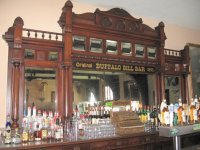
Buffalo Bill's Bar
After visiting the old building I remembered other things about Sheridan. I had met a gentleman that ran a little restaurant. Beside it was his coin shop. I rode back to Main Street hoping that I could remember that restaurant. The coin shop was there but not the restaurant. I thought it was the same place. I went next door to a shop and told the lady there my story. I told her that a man who ran the two businesses had befriended me in 1967 and let me sleep in his restaurant. He helped me find a job stacking hay for a local farmer for two weeks. The woman knew who I was talking about. She looked in the phone book and gave me the number for George Ghikas. I called the number and he answered. I said, “Mr. Ghikas, in 1967 I came through Sheridan on a bicycle and you let me stay in your restaurant and you found me a job. Do you remember me?” He replied, “Is that you Joe? I always wandered what had happened to you.” For the next two days George and I were together talking about old times.One day he drove me to Custer’s Battlefield in Montana. He is still an awesome man at 82 years old. He paid me a great compliment. He said that after I left Sheridan he went to a bicycle store and bought a ten-speed bicycle and rode it several times a week for 25 years. George, if you get to read this, you were a real blessing for me on the ‘67 bicycle trip as well as the 2005 bicycle trip. And thanks a million for those wonderful steak dinners. I would have never known where to find the best steaks and oldest operating saloon in Wyoming- the bar in Big Horn, Wyoming. The people were great there, too. Thank you, George, for the eternal friendship and the down-home philosophy you shared with me. The one I take seriously even though it may be a little late is, “Save a little gold as you go or your Golden years won’t be golden.” And I’ll be thinking about one of the others for a very long time; “This old Earth of ours is going to rebel against us for what we are doing to her.”
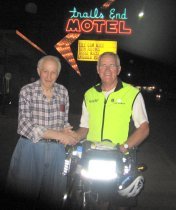
Mr. Ghikas